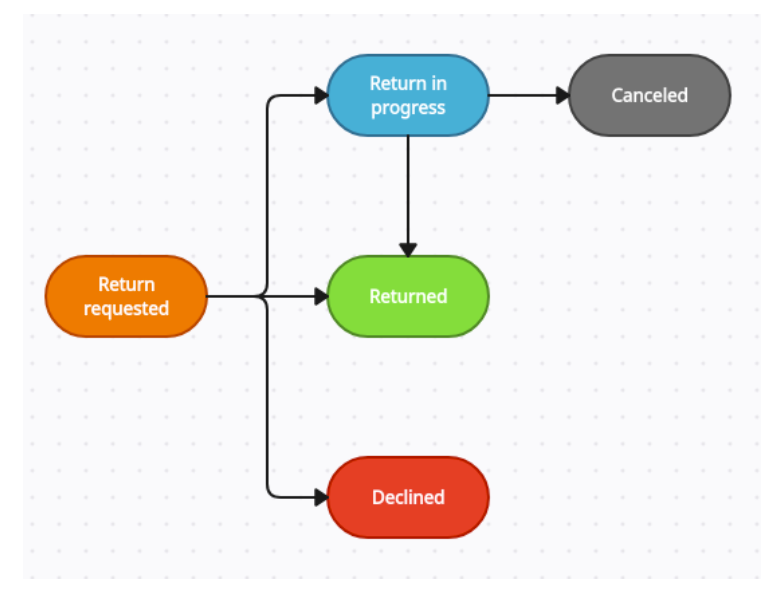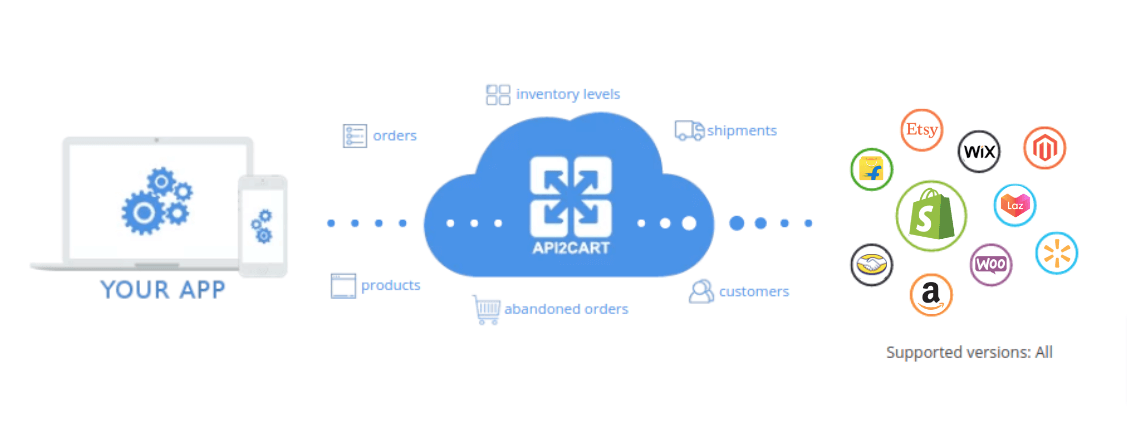
Returns management is one of the most critical parts of modern eCommerce operations. According to National Retail Federation, the average retail return rate remains above 14% of total sales, with online returns significantly higher in certain categories. For SaaS vendors building solutions for merchants, efficient return automation through Shopify API Returns and broader Shopify API capabilities is no longer optional but a core operational requirement.
At the same time, BuiltWith reports millions of live Shopify stores worldwide, making Shopify one of the largest eCommerce ecosystems. Therefore, supporting Shopify API Returns becomes a strategic requirement for any serious eCommerce integration solution.
By integrating with the Shopify API, software vendors can automate return requests, refunds, restocking, and inventory updates. This enables consistent data synchronization and reduces operational friction across merchant workflows.
In this article, we explore how Shopify API Returns works, what challenges SaaS providers face, and how to simplify return management integration using a unified API approach.
What Is Shopify API and How Does It Work for SaaS Integrations?
Shopify, a leading eCommerce platform, offers a robust API that enables developers to interact with its core features programmatically. The Shopify API is a set of HTTP-based RESTful and GraphQL interfaces that allow developers to access and manipulate data related to products, orders, customers, and more.
Software developers can create custom applications (Shopify Applications) that store owners can use to upgrade the usefulness and automation of their stores. They can develop different applications and connections, including returns management software, mobile applications, order and inventory management systems, etc. Shopify offers broad API documentation and developer resources to help with building and maintaining applications that cooperate with Shopify stores.

What Are the Shopify API Returns Specifics Developers Should Know?
When building returns automation for Shopify merchants, understanding Shopify API Returns specifics is critical. In practice, Shopify follows a predefined return workflow, which means developers must align their logic with platform constraints instead of creating fully custom return states.
Limitations and Platform Peculiarities
First of all, Shopify enforces a structured return lifecycle. Developers cannot assign arbitrary return statuses. Instead, the platform allows transitions only within its predefined return flow, which ensures data consistency but limits customization flexibility.

Secondly, returns can only be created for existing orders. In other words, Shopify API Returns logic is strictly order-based, meaning your SaaS must first validate the order before initiating any return operation.
Additionally, Shopify allows filtering orders that already have associated return records. This makes it possible to build dashboards that track return frequency, refund status, and inventory impact in real time.
For a deeper technical overview of return-related API methods, parameters, and implementation examples, refer to the detailed guide here.
How to Easily Access and Manage Shopify API Returns?
For SaaS vendors building return automation, accessing Shopify API Returns efficiently is critical. Instead of developing a separate Shopify integration from scratch, you can use API2Cart — a unified API that connects your software to 60+ eCommerce platforms through a single integration layer.
As a result, your development team does not need to handle Shopify-specific return logic independently. API2Cart standardizes return data across platforms, reducing integration complexity and accelerating time to market.

To retrieve and manage Shopify returns, API2Cart provides a structured set of API methods:
- return.list – retrieve all return requests;
- return.info – get detailed return information;
- return.reason.list – retrieve available return reasons;
- return.status.list – retrieve return statuses;
- order.return.add – create a return request;
- order.return.update – update return or shipment information.
For example, the return.list method returns a standardized response structure that includes return ID, associated order ID, customer data, return status, product-level return details, reasons, actions, timestamps, and pagination data.
Here is the response structure of return.list method:
{
"return_code": 0,
"return_message": "string",
"pagination": {
"previous": "string",
"next": "string",
"additional_fields": {},
"custom_fields": {}
},
"result": {
"total_count": 0,
"returns": [
{
"id": "string",
"name": "string",
"order_id": "string",
"customer_id": "string",
"store_id": "string",
"created_at": "string",
"modified_at": "string",
"status": {
"id": "string",
"name": "string",
"additional_fields": {},
"custom_fields": {}
},
"order_products": [
{
"product_id": "string",
"order_product_id": "string",
"sku": "string",
"name": "string",
"quantity": 0,
"reason": {
"id": "string",
"name": "string",
"additional_fields": {},
"custom_fields": {}
},
"action": {
"id": "string",
"name": "string",
"additional_fields": {},
"custom_fields": {}
},
"condition": "string",
"customer_comment": "string",
"additional_fields": {},
"custom_fields": {}
}
],
"comment": "string",
"staff_note": "string",
"additional_fields": {},
"custom_fields": {}
}
],
"additional_fields": {},
"custom_fields": {}
},
"additional_fields": {},
"custom_fields": {}
}
Because API2Cart normalizes Shopify API Returns responses, your SaaS can process return data consistently across multiple platforms — not just Shopify. This enables you to build centralized return dashboards, automate refund workflows, and synchronize inventory updates without platform-specific rewrites.
Business Benefits for eCommerce Software Providers
Beyond technical simplification, API2Cart helps you deliver tangible operational value to your clients:
- Automate the entire returns lifecycle from request to inventory adjustment;
- Synchronize order, stock, and refund data in near real-time;
- Generate structured reports and analytics for return performance;
- Maintain data consistency across multiple connected platforms.
Additionally, API2Cart provides extensive platform coverage, standardized data models, robust security practices, continuous API updates, and comprehensive documentation — all of which reduce long-term maintenance overhead.
Also, using API2Cart for integration and managing Shopify API Returns, you, as an eCommerce software provider, can provide the following functionality to your clients:
- Fully automate all the steps that are required in managing returns
- Automatically synchronize order information and the stock quantities
- Organize the data in detailed reports
API2Cart Advantages for eCommerce Software Vendors
1. Extensive Platform Coverage
API2Cart allows software solutions to work with more than 60 shopping carts such as Magento, Shopify, WooCommerce, BigCommerce, etc. This broad compatibility enables the software to easily penetrate the market without having to go through the many, long and tedious integration processes.
2. Efficient Data Synchronization
API2Cart offers the synchronization of the product, order, customer, and other essential data of the eCommerce stores. This synchronization helps in making sure that all information that is posted on different platforms is consistent, which in turn makes the customers' experience better. This service has API methods that allow for pull, push, update or delete data.
3. Robust Security Measures
This is a very important factor in any eCommerce business and API2Cart has measures to ensure that the data is protected and that there is secure transfer of the data. The service also adheres to the standard practices and rules and regulations of the industry thus giving the business a guarantee of the safety of their information.
4. User-Friendly Support and Resources
API2Cart is quite useful and has a lot of functions to assist the users including those who are not conversant with technology. The documentation, API references, and customer support help the users to get the maximum out of the solution.
5. Continuous Updates and Innovation
In order to provide businesses with the most current information regarding developments in the constantly changing sphere of eCommerce, the service frequently updates the connections with eCommerce platforms.
6. Flexibility and Customization
API2Cart provides software suppliers with a great number of API methods which can be used to implement the business needs and functions.
Therefore, using Shopify API in combination with API2Cart, software can obtain all the necessary return data from different platforms, streamline their processes, and avoid possible discrepancies with inventory, thus improving customers' satisfaction.
Conclusion
Returns management is a critical operational layer for Shopify-based businesses. Therefore, for SaaS vendors, structured access to Shopify API Returns is not just helpful, it is essential for delivering reliable automation and accurate inventory synchronization.
However, building and maintaining direct integrations requires continuous API monitoring, version updates, and engineering effort. Over time, this slows down product innovation and increases maintenance costs.
By using API2Cart as a unified integration layer, you can manage Shopify API Returns and other store data through a single standardized API connection. As a result, your team reduces development time, simplifies maintenance, and accelerates time to market.
Sign up for API2Cart and simplify your Shopify returns integration today!



